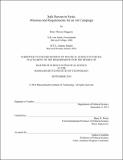Safe havens in Syria : missions and requirements for an air campaign
Author(s)
Haggerty, Brian Thomas
DownloadFull printable version (2.886Mb)
Alternative title
Missions and requirements for an air campaign
Other Contributors
Massachusetts Institute of Technology. Department of Political Science.
Advisor
Barry R. Posen.
Terms of use
Metadata
Show full item recordAbstract
What if the United States had led its NATO allies to intervene in Syria's civil war in the midst of calls for humanitarian intervention in mid-2012? Despite the importance of this question for the study and evaluation of U.S. foreign policy, little exists in the way of systematic, open-source analysis of the military missions and material requirements for a possible Syrian intervention. This thesis assesses the scale, scope, and challenges of intervention in Syria at the time its proponents argue it would have been most effective. It does so through open-source analysis of a U.S.-led air campaign designed to mitigate the country's humanitarian crisis. The model of intervention analyzed -- broadly conceived as the establishment of safe havens around major Syrian population areas defended from the air -- offers a template for evaluating the utility of air power in the Syrian context more generally. The analysis suggests an intervention in mid-2012 to establish safe havens in Syria would have been a major military undertaking, likely requiring greater resources and facing greater risks than any of NATO's previous air campaigns in response to humanitarian crises in Bosnia, Kosovo, or Libya. The "low-risk" rationale for humanitarian intervention from the air thus appears far less persuasive in the Syrian case. The thesis concludes with implications for the application of air power to future humanitarian crises.
Description
Thesis: S.M., Massachusetts Institute of Technology, Department of Political Science, 2014. This electronic version was submitted by the student author. The certified thesis is available in the Institute Archives and Special Collections. Cataloged from student-submitted PDF version of thesis. Includes bibliographical references (pages 102-109).
Date issued
2014Department
Massachusetts Institute of Technology. Department of Political SciencePublisher
Massachusetts Institute of Technology
Keywords
Political Science.